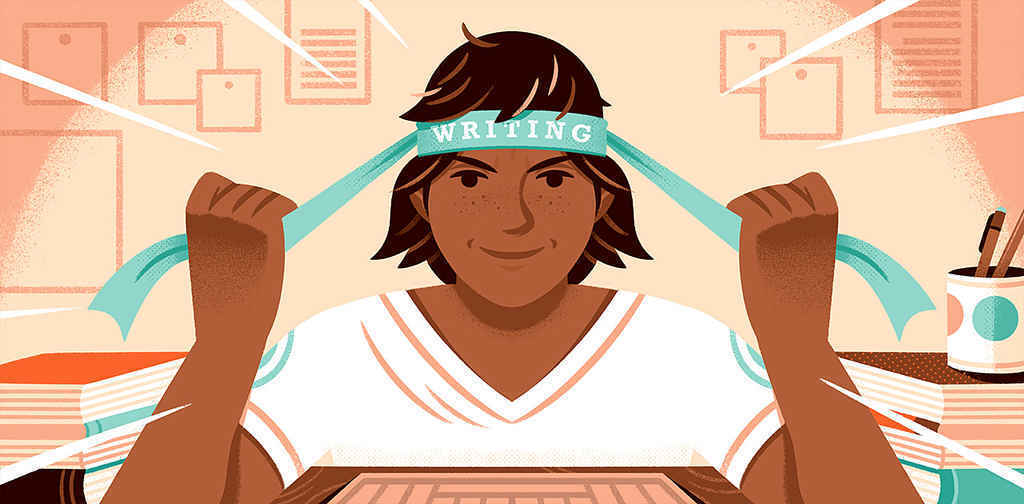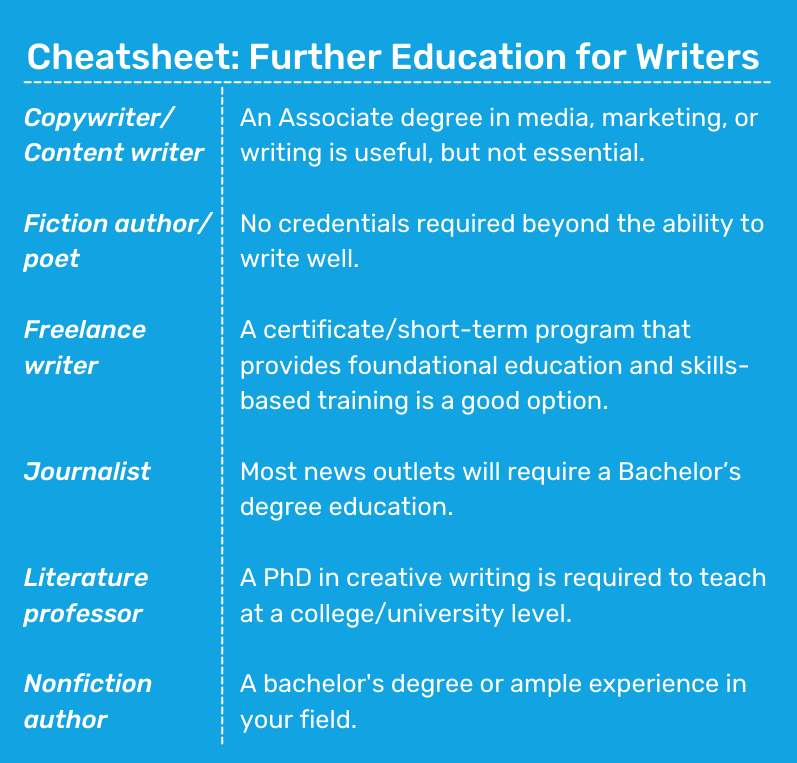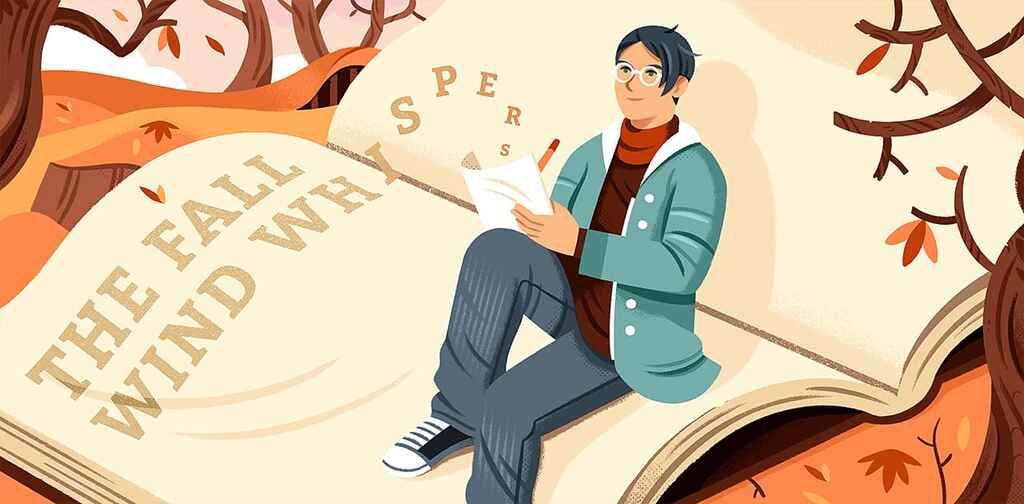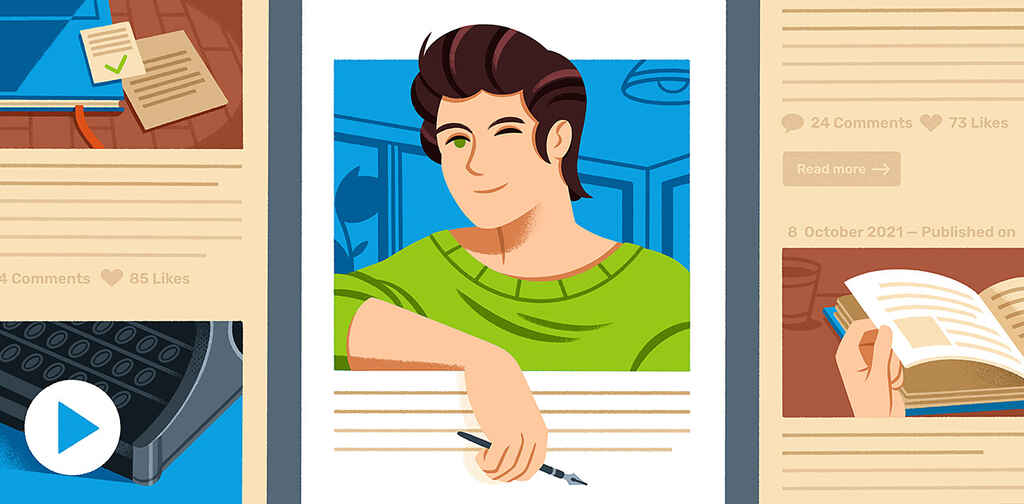Blog •
Last updated on May 02, 2022
How to Become a Writer: 7 Practical Steps
If you’re dreaming of turning your passion for writing into a full-time career, you’re in the right place. In this post, we’ll go through a series of actionable steps that you can take to start writing professionally.
Here are 7 steps to help you become a writer:
1. Create a solid writing routine
 Finding the time to write in a jam-packed schedule is the first hurdle for almost every aspiring author. Countless talented writers never make it past this obstacle, but those who do are already halfway to ‘making it’ — all you have to do is make writing a regular habit.
Finding the time to write in a jam-packed schedule is the first hurdle for almost every aspiring author. Countless talented writers never make it past this obstacle, but those who do are already halfway to ‘making it’ — all you have to do is make writing a regular habit.
Here are a few tips for establishing a writing habit:
Make writing a priority. If you want to be a professional writer, set non-negotiable writing time in your calendar and arrange your other commitments around it.
Define your writing goals. Whether it’s a daily number of words or completing a task in a set number of days, goals help break larger projects into manageable chunks — so you’ll be less overwhelmed and more likely to knuckle down and write.
Identify your ideal writing times. Do you tend to get the most done right after waking up in the morning, or during the quiet hours of the evening? Figure out your windows of productivity and capitalize on them.

FREE COURSE
How to Build a Solid Writing Routine
In 10 days, learn to change your habits to support your writing.
However, no matter how watertight your writing routines are, every author can benefit from a helping hand to perform at their best and become an even better writer. Thankfully, there are some apps for that.
2. Use writing tools to improve your output
 If you want to become a full-time writer, you need to equip yourself with the right environment and the best writing tools.
If you want to become a full-time writer, you need to equip yourself with the right environment and the best writing tools.
Different tools can impact your output in different ways: for example, online whiteboards like Miro can help you visually sketch out your book’s outline and character bios, and help you define the mood of your world-building. Tools like Grammarly can identify and fix typos and grammatical errors, whereas browser blockers like Cold Turkey can help to minimize distractions and stay productive.
When it comes to using professional writing software, you could use tools like Reedsy Book Editor to enjoy smooth collaborative editing, keep track of your word count goals, and format your book for distribution.
🖋️
Which writing app is right for you?
Find out here! Takes 30 seconds
Finally, workspace tools like ergonomic chairs and standing desks can also largely influence the quality and proficiency of your writing (we also hear that houseplants can boost creativity, but don’t quote us on that).
But, before you get too comfortable in your writing nook surrounded by all your lovely tools, you may want to consider going back to class…
3. Take classes to pick up credentials
 The relevance or necessity of academic credentials to become a successful writer largely depends on the type of writing job you want. While ‘novelist’ or creative writer might be what most people think of when they imagine a writing career, that's not the only way to earn your living as a professional writer. Here are a few alternative options to consider:
The relevance or necessity of academic credentials to become a successful writer largely depends on the type of writing job you want. While ‘novelist’ or creative writer might be what most people think of when they imagine a writing career, that's not the only way to earn your living as a professional writer. Here are a few alternative options to consider:
- Journalist — write for newspapers and magazines. Requires top-notch research skills, the ability to be objective, and to meet strict deadlines.
- Columnist — write for newspapers and magazines. Unlike journalists, columnists offer their subjective opinion and insight on current events.
- Travel writer — chronicle your adventures across the globe to give advice and inspiration to other travelers.
- Copywriter — write marketing copy for brands, companies, or organizations.
- Technical writer — turn complex jargon into concise information that users of a product or clients of a company can clearly understand.
- Web content writer — write online blog posts and articles for brands, companies, or organizations.
- Ghostwriter — write content on behalf of other people or organizations. Learn more about becoming a ghostwriter here!
- Grant writer — write documents to help organizations seeking grants.
The options are plentiful. But if you think you’ll need academic credentials, let's take a look at your choices in closer detail.

JOIN REEDSY
Find exciting new projects
We connect publishing professionals with our community of 1,500,000 authors.
MFA
You needn't look too hard to find authors who emerged from MFA programs to establish glittering literary careers. For example, both Flannery O’Connor and Rachel Kushner are MFA babies.
Then again, you can find just as many authors who didn’t study anything related to writing and worked in completely unrelated industries before becoming bestsellers — like Charles Bukowski (a postman), Haruki Murakami (a jazz club manager), and even Harper Lee (an airline ticket clerk). After all, life experience is a key ingredient of any good fiction.
Becoming a novelist doesn’t require any specific credentials beyond the ability to write (and market) a great story. Pursuing an MFA can certainly help you develop your craft, network with established and aspiring writers, or lead you to some creative writing gigs, but it’s not a shortcut to success. In addition, the majority of MFA programs focus on literary fiction, creative nonfiction, and poetry. So if you want to become a fiction writer, an MFA is likely not a necessary stepping stone for you.
Bachelor’s Degree (BA)
While higher education is not a required credential for becoming a novelist, academic qualifications can be more important for nonfiction writers. In many cases, success as a nonfiction author relies upon your subject authority and often necessitates the relevant credentials as proof. That might include a degree or other relevant experience in the field. Imagine yourself picking up a nonfiction book and turning it over to read the author's bio: what kind of credentials would assure you this is someone who knows what they’re talking about?
In terms of journalism, most news outlets will require applicants to have completed a Bachelor’s degree before adding them to the payroll. While majoring in journalism is certainly a sound option, many news outlets require a literature degree or similar, as you’ll have many of the same skills but no biases in your journalistic practices. It's also typical to double-major or major-minor in a combination of journalism and the field you’re interested in writing about.
Doctorate (Ph.D.)
A Ph.D. in literature or creative writing is often preferred by people who want to teach literature or writing at college or university levels. Overall, a doctorate may also be appropriate if your writing draws extensively from academic research or scientific findings — as it will give you more subject-matter authority.
Associate Degree
An associate degree typically lasts two years and can be more industry-focused than a BA. If you’re hoping to become a copywriter or web content writer, pursuing an associate degree in media, marketing, or writing might be a good way to lay the foundation for your career.
Certificate
Certificates are short-term programs that provide foundational education and skills-based training. They typically last a few weeks to a few months, and, as with the associate degree, it’s a good option for aspiring freelance writers.
 Again, while not all kinds of writing careers require specific degrees, seeking relevant, formal education certainly won’t harm it. That said, with the written word nestled comfortably in the digital landscape, it's more important than ever for writers to sniff out opportunities to publish their work and establish their names.
Again, while not all kinds of writing careers require specific degrees, seeking relevant, formal education certainly won’t harm it. That said, with the written word nestled comfortably in the digital landscape, it's more important than ever for writers to sniff out opportunities to publish their work and establish their names.
4. Seek opportunities to publish your work
 Once you’ve produced work that you’re proud of, it’s time to start seeking opportunities to publish it. Countless print and online publications eagerly accept work from budding writers. Submitting to these places will give you the opportunity to build your portfolio, and provide you with valuable experience in tailoring your writing to specific outlets.
Once you’ve produced work that you’re proud of, it’s time to start seeking opportunities to publish it. Countless print and online publications eagerly accept work from budding writers. Submitting to these places will give you the opportunity to build your portfolio, and provide you with valuable experience in tailoring your writing to specific outlets.
Fiction
If you’re an aspiring fiction writer, follow the likes of Ursula K. Le Guin and Ernest Hemingway, and get your foot in the door by submitting your short stories to magazines and contests. Here are a few places where you can do just that:
- Literary magazines accepting submissions
- Vetted writing contests and their deadlines
- Reedsy’s own weekly short story contest
- Publications accepting short story submissions
To ensure your t’s and i's are all properly crossed and dotted, here is a submissions checklist that’s sure to keep you straight!
Make the process of writing your first novel easier by using a story template like the one below.

FREE RESOURCE
Get our Book Development Template
Use this template to go from a vague idea to a solid plan for a first draft.
Nonfiction
Nonfiction writers have ample opportunity to get their byline out in the world too. If there’s a particular niche you’re interested in, start by putting together a list of relevant publications. Most websites will have a submission section with guidelines for submitting a piece.
Follow specific editors on Twitter to keep up with when magazines are accepting pitches. They will usually tweet when their inbox is open (and what they’re looking for in a pitch) — plus many of them are open to questions. If you don't know where to find them, look for names via magazine websites, the publication’s LinkedIn page, or simply use the Twitter search function. Editors of magazines usually tell you who they are in their Twitter bio!
Put your pitches and deadlines in a calendar
Next, get your ‘pitching calendar’ organized by listing the outlets you want to write for, your premise for each pitch, and any deadlines to keep in mind. You might also want to make note of any feedback you receive. For instance, an outlet might let you know that your piece wasn’t right for them “at this time,” or they might clarify what they’re looking for in more specific terms.
Here are a few resources that connect writers with publications looking for submissions:
Consider self-publishing
If you have a book idea you can’t stop thinking about and your goal is to see it materialized, then you might want to consider self-publishing. Getting your book out into the world is easier than it’s ever been, and we’ve detailed the whole process in another guide. Plus, you can do it in your own time.
Though some traditionally published household names nab hundreds of thousands in advances, those are the outliers. Many more self-published authors make a living from their writing than their traditionally published counterparts: this report found that the number of indie authors earning five to six figures per year from book sales was much higher than the number of Big 5 authors earning the same.
If you’re still on the fence about which publishing route to take, why not take this one-minute quiz to find out for sure which option is the most viable for you?
✅
Is self-publishing or traditional publishing right for you?
Takes one minute!
Once you start to get a few publications under your belt, it’s time to put them together in a nicely bundled portfolio that shows the world (and potential clients) what you’re capable of.
5. Create a strong portfolio
 Besides maintaining an active social media presence and sharing your latest pieces on platforms like Twitter and LinkedIn, your personal website is your calling card. It will ensure that when editors, agents, or publishers look you up (and they will), they can immediately find your writing portfolio — and see that you’re dedicated to your career. Here’s how to put together a portfolio that attracts clients:
Besides maintaining an active social media presence and sharing your latest pieces on platforms like Twitter and LinkedIn, your personal website is your calling card. It will ensure that when editors, agents, or publishers look you up (and they will), they can immediately find your writing portfolio — and see that you’re dedicated to your career. Here’s how to put together a portfolio that attracts clients:
Create a website
To create your own website, you must first register a domain name on services like GoDaddy or Namecheap (e.g. authorname.com), or sign up for a free site with services like WordPress, Wix, or SquareSpace (e.g. authorname.wordpress.com) 一 although the first option is more professional. If you're not too confident in your tech skills, consider hiring a professional web designer who can help you build a website that stands out.
Use a portfolio site
If you don’t want to spend too much time designing a website, you can always turn to a trusted portfolio site. All you need to do is create an account with them and input your personal information. Here are a few popular options:
- MuckRack: a popular platform for journalists and PR professionals.
- Contently: a useful site for content writers.
- Clippings.me: provides a clean-cut design for every kind of writer.
Perfect your website
Your author website should reflect your personality, list your credentials, and most importantly — show your work.
There are different ways to present your portfolio: you could divide your writing into different niches like Jennifer Fernandez, or you could go for a concise bio that packs a punch in terms of insight into your professional background as in Alice Driver’s portfolio. For author websites, it’s key to give visitors a clear route to buying any books you’ve published (check Austin Kleon’s example).
Once your website is live, it might take a while for word of mouth to spread and for job opportunities to come your way. So, while you get the ball rolling, consider reaching out to organizations that could help you support your dream (read: paying the bills!).
6. Apply for writing grants
 Until you manage to write professionally full-time, a writing grant can help you finish those big, time-consuming projects on your hands, acting as a buffer when actual income is patchy.
Until you manage to write professionally full-time, a writing grant can help you finish those big, time-consuming projects on your hands, acting as a buffer when actual income is patchy.
Here’s a reliable list of grants for you to peruse — some will have no stipulations regarding what the money is spent on, and others will be for specific reasons, like traveling to a writers’ retreat or conference. There are also many grants specifically intended to help marginalized communities get a leg up in the industry. Make sure you check out our video guide for some helpful advice on making a successful application.
Whether or not your career will benefit from scoring a grant, you’ll soon learn that if you want to reach new literary heights and establish yourself as a writer, you’ll need the help of other professionals in the space.
7. Collaborate with professional editors
 As soon as your budget allows for it, aim to collaborate with professional editors to improve your craft, acquire industry knowledge, and land ambitious projects.
As soon as your budget allows for it, aim to collaborate with professional editors to improve your craft, acquire industry knowledge, and land ambitious projects.
An editor’s bread and butter is to revise your work so that it’s ready for the big stage, from spotting plot holes, improving text quality, and examining your manuscript for inconsistencies before its release. More than that, working with an editor will teach you about the ins and outs of the publishing industry — including the all-important standards and best practices of the literary world.
Finding a good editor is always a type of collaboration worth investing in if you want to speed up your development and make a leap forward in your journey to become a professional writer.
Hopefully, this post has shown you how to get things going so that you can make writing a financially viable career. To wrap things up, there’s nothing quite as inspiring for budding writers as words of wisdom from those who have achieved writerly acclaim. So tuck into these brilliant books about writing, and then pick up your pen and get going. We look forward to seeing your name in print!

